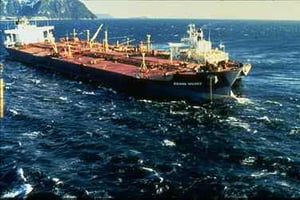The simple answer to how much it costs to clean up an oil spill is thousands to millions to billions of dollars. It is, of course, not a simple question. And, there can be no simple answers.
Here’s a quick recap of the notable ones with a recently revealed estimate of expected damage in a sensitive area.
The Big One
The 2010 BP Deepwater Horizon spill is estimated to cost $61.6 billion when all the lawsuits and settlements are completed.
The Major Ones
 The 1989 Exxon Valdez spill cost $3.8 billion, but the lawsuits continue.
The 1989 Exxon Valdez spill cost $3.8 billion, but the lawsuits continue.
The 2015 El Capitan State Beach spill in Goleta, CA, with 2,500 barrels of oil from a pipeline cost $62 million to clean up 100 miles of coast line.
Predictions
The oil spill damage estimates around a potential spill from the Enbridge Line 5 Pipeline under the Mackinac Straits in Michigan range from $450 million to $1 billion with four to nine months to clean up and estimated 8,500 barrels of oil.
Cost Factors
Reviewing a white paper on estimating clean up costs shows that there are many factors that drive the cost of an oil spill. Those factors include: location, oil type, clean up strategies, and spill amount.
- Location. This involves geographical and political issues. They found that the cost per tonne of oil spilled in 1997 ranged from $73,156 in the United States to $8,595 in Europe down to just over $2,000 in South America and Australia and bottoming out at $1,000 in Africa.
- Oil Type. As you can imagine heavy fuels and crude oil carry the biggest per tonne clean up costs at $15,000 to $16,000, respectively. The lowest is gasoline at $3,500 per tonne.
- Clean Up Strategies. These range from mechanical or manual recovery at $12,500 per tonne to dispersants only at $2,100 per tonne. The key is keeping the oil off shore. Once it hits the shoreline costs climb dramatically.
- Spill Amount. Here the cost per tonne declines as the oil spill size increases. It ranges from $10,000 per tonne at the smallest spills to less than $1,000 for the very largest spills.
Increases over time is another factor due to increasing litigation as well as changing social and political pressures around environmental responsibility.
What About Minor Oil Spills?
Even with the huge impact of these major spills, as we noted in “An Overview of Oil Spills,” the minor spills probably do more damage but are far less noticed in the media.
Just as with a leaky water faucet, minor spills and leaks can add up to a tremendous amount over time. Here’s a quote from Industrial Supply Magazine in “Oil Spill Cleanup Veterans Join Forces:"
 According to experts, more than 80% of all hydrocarbon spills happen on land due to vehicle accidents or equipment failures, such as blown hydraulic hoses.
According to experts, more than 80% of all hydrocarbon spills happen on land due to vehicle accidents or equipment failures, such as blown hydraulic hoses.
Every time a garbage truck blows out a hose, there’s a spill that doesn’t hit the news but does have an impact on the environment. Visit any industrial operation, particularly a refinery, and spills are happening all the time. Fortunately, industrial operations and refineries are well set up to contain these types of spills.
What You Can Do
We've noted before that there are four key steps to a successful clean up:
- Control. Ensure the spill doesn’t continue by shutting off valves, etc. Take all necessary safety precautions including suitable protection equipment.
- Contain. Deploy your spill kit by surrounding the spill, drag booms across the spill area, use water to move the spill to a low area.
- Clean Up. Leave the booms to absorb the spill, add pillows to deep areas, pads to finish the clean up. Place everything in disposal bags.
- Remediate. Make sure everything is cleaned up including any damage to nearby soil, etc.
As you know, spill kits are the big key in cleaning up an oil spill. You need to have them available and they need to contain all that’s needed to do their job effectively.
How We Can Help
We worked with HalenHardy to develop the Spilltration™ line of spill control products. They are engineered to work, rain or shine. They take up 75% less storage space, and they deploy very quickly. All this saves time and money as well as protects the environment and prevents fines.
We have solutions for every type of spill or leak. They include spill kits, shammy towels, and basins as well as husky strips, rugs, and pads. Further, the Spillver Bullet™ offers not only incredible spill control but remarkably lower storage space requirements.
Want to Learn More?
We’d be delighted to discuss how we can help you prepare for large and small oil spills. Use our contact page, or call us at 888-653-7509.

